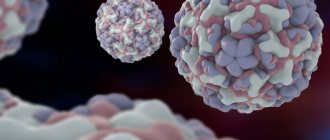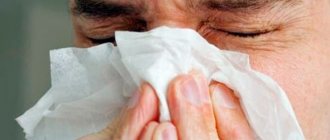A runny nose during pregnancy is quite common. There may be many reasons for it, but the result is the same – the woman’s uncomfortable state. In addition, this will lead to a lack of oxygen supply to the body of the expectant mother, and consequently to the child. It is also possible for infection to enter during the period when breathing is carried out through the mouth, because the air is cleaned and warmed only in the nasal passages. As with other health problems, not all remedies can be used to alleviate the condition during pregnancy. Let's figure out how to treat a runny nose in pregnant women, and what medications women are allowed to use during this period.
- Reasons for appearance
- Runny nose in the early stages
- Treatment of a runny nose Drops, sprays, ointments
- Inhalations
- Nasal rinsing
- Folk remedies
- Drink plenty of fluids
- Acupressure
- Thermal and warming procedures
- Additional procedures
Reasons for appearance
Rhinitis can occur as a result of the following reasons:
- hormonal changes;
- allergy;
- colds, ARVI;
- dry indoor air.
Enormous changes in the hormonal background of a pregnant woman affect the functioning of many internal organs and systems of a woman.
They can also lead to the occurrence of vasomotor rhinitis or the so-called rhinitis of pregnant women. It is associated with the condition of the vessels of the nasal mucosa and can be very long-lasting, right up to childbirth. Typically, vasomotor rhinitis begins in the first trimester.
However, it may also be the result of a complication that arose in the third trimester called gestosis, which, as a rule, is accompanied by swelling, including swelling of the nasal mucosa.
You will also be interested in how to treat allergies in pregnant women.
Vasomotor runny nose is characterized by the causeless appearance of congestion in the nasal passages. The general condition of the woman does not worsen. A clear liquid flows from the nose, sneezing appears, and lacrimation is possible.
This type of runny nose cannot be treated. It goes away on its own 7-10 days after birth.
Allergic rhinitis can also start unexpectedly. It occurs as a result of the body’s reaction to some irritant (allergen). Pregnancy can affect the course of allergies in different ways. For example, it can provoke its appearance for the first time and to those products or substances to which allergic reactions have not been observed before. It can also aggravate a woman’s condition if she has previously had allergies.
There are a large number of allergens in the surrounding world: these include emissions into the atmosphere, food products, chemicals (present in food, furniture, clothing, cosmetics, detergents), and animal dander.
Important! If any type of rhinitis occurs, its causes and methods of treatment should be determined only by a gynecologist who monitors the course of pregnancy. Self-diagnosis and self-medication when carrying a child are prohibited.
Allergic rhinitis, like vasomotor rhinitis, is characterized by clear discharge, accompanied by sneezing, nasal congestion, sore throat and lacrimation. Sometimes the temperature may rise slightly. This type of rhinitis cannot be treated. To eliminate it, you will need to avoid contact with the allergen.
You can distinguish between an allergic and a viral runny nose by whether changes occur in the discharge. So, with viral or cold rhinitis, after a couple of days, as a rule, the discharge changes from a liquid state to a thicker one. Their color changes from transparent to greenish. This type of rhinitis usually goes away within a week, even if left untreated.
What is a runny nose like during pregnancy?
During pregnancy, a runny nose can develop not only against the background of a viral infection. For example, often in the second half of pregnancy, expectant mothers develop vasomotor rhinitis, which is a consequence of hormonal disorders in the body. Vasomotor rhinitis provokes swelling of the nasal mucosa. This type of runny nose cannot be treated with medications and vasoconstrictor drops, however, the condition of the expectant mother can be alleviated by rinsing the nose with saline solutions or herbal decoctions. You can somewhat reduce the swelling of the mucous membrane and relieve nasal congestion using the correct posture during rest - tilt your head back a little and lightly massage the wings of your nose.
Runny nose in the early stages
If the cause of a runny nose in the first trimester is a viral infection, then this can negatively affect the fetus and the course of pregnancy. The infection can penetrate the placenta and lead to abnormalities in the development of the embryo, since it is in the first three months that all vital systems and organs are formed.
In addition, the infection reduces the already weak immunity of a pregnant woman. Difficulty breathing will interfere with a woman’s normal rest and healthy sleep, and, accordingly, will lead to stress in the body.
If it is determined that nasal discharge is the result of hormonal changes, then the pregnant woman, after consulting a doctor, needs to help herself with various manipulations to make it easier to tolerate this condition. After all, constant mouth breathing is also fraught with the development of hypoxia - a lack of oxygen both for the mother herself and for the baby in the womb.
Did you know? The internal cavity of the uterus of a woman expecting a child increases almost 500 times. In normal condition, this female organ weighs like a chicken egg - about 100 g, and by the end of pregnancy it can reach a weight of 1 kg. The process of reducing the uterus after childbirth lasts about two months.
In addition, an infection in the nasal passages can lead to more serious diseases that will require the use of strong medications and even antibiotic therapy, which is extremely undesirable in the first trimester. Such diseases may include, for example, sinusitis, sinusitis, and nasopharyngitis.
Treatment of a runny nose
Treatment of a runny nose during pregnancy should be carried out competently and as safely as possible. There are not many means that will not harm the child and will be effective: among them are inhalations, rinsing, massage and other procedures.
It will be useful for you to read about the treatment of common problems during pregnancy: hemorrhoids, diarrhea, constipation, varicose veins, and cramps.
Drops, sprays, ointments
The most common way to eliminate a runny nose and relieve swelling is to use vasoconstrictor drops. However, pregnant women can only use those made from natural substances. And they, as a rule, have little effect.
Drops and sprays that can be used by pregnant women for a runny nose include:
- "Pinosol" with herbal ingredients;
- Euphorbium compositum is a homeopathic remedy.
Of the drops and sprays that have a vasoconstrictor effect, the following are contraindicated for pregnant women:
- "Sanorin";
- "Nazivin";
- "Naphthyzin";
- "Galazolin";
- "Vibrocil";
- "Nazol."
These drugs, along with the narrowing of blood vessels in the nose, also narrow the capillaries of the placenta, which can provoke fetal hypoxia, increased pressure and spasms.
For the treatment and prevention of viral rhinitis, you can use Oxolinic ointment. It is used to lubricate the mucous membranes in the nasal passages before each visit to the street and places with large crowds of people. It will prevent viruses from settling on the mucous membrane. After returning home, the passages must be washed with a saline solution.
It is also possible to use Evamenol ointment. It is applied to the nasal mucosa.
Inhalations
You need to be careful with inhalations, since not all substances can be used during this period. In normal times, inhalation with essential oils helps a lot. However, there is a list of oils that are strictly prohibited during pregnancy. This list, in particular, includes oils:
- juniper;
- rosemary;
- mint;
- myrtles;
- nutmeg;
- cedar
All ether inhalations should be avoided during the first three months of pregnancy.
Did you know? On the date of birth, which will be registered in the exchange card for pregnant women based on the gynecologist’s calculations and ultrasound results, only 5% of women give birth. For everyone else, birth occurs within two weeks before or after the planned day
.
For colds, moisturizing inhalations from a nebulizer using saline solution or Borjomi mineral water have worked well. They are also good for coughs and sore throats.
Nasal rinsing
Nasal rinsing is good for nasal congestion and runny nose. You can prepare a saline solution: 1 teaspoon of salt per half liter of warm water.
You can also buy saline solution or a runny nose spray for pregnant women with sea water at the pharmacy:
- "Aqua Maris";
- "Humer";
- "Marimer";
- "Otrivin";
- "Aqualor";
- "Saline."
Folk remedies
Folk remedies for a runny nose during pregnancy include frequent inhalation of the smell of onion or garlic - chop the onion or garlic, bring it close to the nose and breathe.
It is also popularly believed that rhinitis can be cured by instilling carrot and beet juice. Carrot juice can be mixed with olive oil.
Drink plenty of fluids
Drinking plenty of warm fluids is recommended for viral diseases, coughs and runny noses. A sick person should drink at least two and a half liters of fluid per day. This will help the body remove viruses from the body faster and prevent sputum and nasal discharge from drying out.
Drinks that are recommended to drink when you have a runny nose:
- teas, simple and with the addition of honey and lemon;
- herbal decoctions;
- milk with honey (for sore throat – cocoa butter);
- rosehip decoctions.
By the way, you can’t overdo it with the latter. You can drink no more than two glasses a day. Rosehip, in addition to enriching the body with vitamin C, removes the necessary potassium. It also has a bad effect on tooth enamel, so it is recommended to drink the decoction from a straw.
With a runny nose and such complications as sinusitis, warm infusions of plantain and strawberries help well.
Before drinking herbal teas, you should definitely study their composition - there are herbs that should not be used during pregnancy, since their effect can cause miscarriage. Thus, abortifacients and those that provoke undesirable complications when carrying a child include:
- sage;
- calendula;
- coltsfoot;
- aloe;
- nettle;
- tansy;
- chamomile;
- St. John's wort;
- cornflower.
Acupressure
Acupressure helps reduce nasal discharge and eliminate congestion. It is necessary to massage the points at the base of the nostrils in a circular motion for a couple of minutes several times throughout the day. The massage can be done simply with your fingers, or you can lubricate them with Doctor Mom ointment or Asterisk balm. The products can also be rubbed into the bridge of the nose and temples.
Thermal and warming procedures
You need to be very careful with thermal and warming procedures during pregnancy, as they can provoke abortion. It is possible to warm the nasopharynx with salt and a boiled egg. Warming with a blue lamp is effective.
Permitted thermal procedures include warming the feet with wool or angora socks. You will need to spend the whole day in them and sleep at night.
Important! Procedures such as hot foot baths, hot baths for the whole body, mustard plasters, steam inhalations during pregnancy are strictly prohibited
.
Additional procedures
Frequent ventilation of the room and wet cleaning will help relieve a woman’s condition with a runny nose.
When sleeping, you need to select a high pillow or raise the head of the head by 40°: sleeping in this position will reduce swelling of the mucous membranes and unblock breathing.
Features of grandmother therapy
Every woman who wants to know how to get rid of a runny nose during pregnancy should clearly know what can be done and what should be avoided. It is strictly not recommended to “prescribe” pharmaceutical drugs to yourself. Antibiotics pose a particular danger to the health of the fetus.
You also cannot treat an unpleasant symptom yourself at home. Unknowingly, the expectant mother may use potent folk remedies, which can also have an adverse effect on the child.
Usually, doctors themselves recommend treating a runny nose during pregnancy with folk remedies. But such treatment should not be uncontrolled.
Therapy with folk remedies should be as gentle as possible. For this reason, doctors recommend treating this symptom with local remedies. A runny nose during pregnancy is wonderfully relieved by the following remedies:
- "Star" ointment;
- inhalation with a nebulizer;
- normalization of drinking regime.
The main criterion for home therapy is safety for the child. The above remedies can cure a runny nose and eliminate many of the risks that may arise during pregnancy.
The most popular medicine
During Soviet times, Zvezdochka ointment was a real panacea for numerous pathologies. Today, “Zvezdochka” has many competitors, which does not prevent it from successfully treating a runny nose during pregnancy.
“Star” is an anti-inflammatory balm that can be used to relieve the virus and pain. “Zvezdochka” consists only of natural ingredients. It is possible to cure a runny nose during pregnancy with the help of “Star”, but with some reservations.
“Asterisk” has a serious contraindication. This balm contains the following oils:
- mint oil;
- clove oil;
- eucalyptus oil.
Against this background, “Asterisk” can provoke an allergic attack. Allergies in themselves are quite dangerous, and during pregnancy the risk of developing angioedema only increases. Also, using this balm, you can get a burn to the mucous membrane. Therefore, before using this balm, you need to carefully test it.
If there is no allergic reaction, then a runny nose during pregnancy can be treated with this remedy. You need to apply a little “Star” to the skin above the lip. After this, lightly massage the balm into the wings of the nose.
The balm should not be applied to damaged skin. You should also avoid lubricating your nasal passages. There is no need to get carried away with using this tool.
The safest remedy
The safest practices for treating a runny nose during pregnancy are nebulizer inhalations. Treatment requires proper preparation and compliance with all safety regulations. A pregnant lady is allowed to do the following inhalations:
- inhalations with saline solution (such inhalations relieve nasal congestion and the development of allergies);
- inhalation with sea salt (for the proper effect you need to mix this ingredient with eucalyptus ether);
- inhalation with eucalyptus decoction (this ingredient should be used with great caution, as it causes allergies);
- inhalation with potato broth;
- soda inhalations (relevant for complicated colds, which are accompanied by a lingering cough);
- inhalation of linden flowers.
Inhalation treatment quickly brings the desired effect. Treatment must be carried out every day. The duration of the procedure should not exceed 15 minutes. The procedure must be repeated every 4 hours. After completing the procedure, you must endure “quarantine”. It is strictly not recommended for an expectant mother to go outside and talk loudly. The “quarantine” time is 120-140 minutes.
Prevention of a runny nose
Prevention of a viral runny nose involves strengthening the pregnant woman’s immune system, following a regimen and responsible behavior.
To do this you need:
- consume more vitamins with fruits and vegetables, especially vitamin C;
- take long and frequent walks in the fresh air (at least two hours a day);
- regularly ventilate living and working areas;
- carry out wet cleaning more often;
- avoid visiting places where there are large crowds of people, especially in the autumn-winter period and periods of epidemics;
- during periods of mass viral diseases, visit public places wearing a medical mask;
- maintain high air humidity in the working and living areas (preferably using humidifiers);
- After consultation with a gynecologist, it is possible to use antiviral ointments for the nose.
To avoid allergic rhinitis, you should:
- replace pillows with hypoallergenic ones;
- refuse to temporarily keep pets, contact with their fur can provoke allergic reactions;
- cover windows with wet gauze during periods of flowering of allergic plants;
- wear a mask during flowering periods;
- wash your nose and mouth after street festivities;
- Vacuum furniture, heavy curtains, and carpets more often.
Thus, if under normal circumstances a person can ignore a runny nose and wait for it to go away on its own, then during pregnancy it is imperative to establish the cause of the disease and treat it.
Making a diagnosis and prescribing treatment procedures should be entrusted to a specialist.
Self-medication during this period is strictly prohibited. Pregnancy Health Runny nose in children











